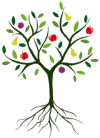Pinova
Pinova is an attractive conical yellow apple with a pinkish-orange flush. It crops heavily and the apples store well.
Pinova apple trees for sale
1-year bare-root
tree
on MM111 rootstock£35.75
Mature height: 3m-5m after 10 years
Can be trained on as a large free-standing apple tree, a half-standard apple tree, a large apple fan or espalier, or a pleached apple tree. Available next season
Growing and Training
Pinova was developed to be resistant to scab, and the blossom has some resistance to late frosts too.
History
Pinova was developed at the Institute for Fruit Research, Dresden-Pillnitz, Germany in the 1980s. It is a cross between Golden Delicious and Cox crossed with Duchess of Oldenburg.
Whilst Cox is not particularly disease-resistant, Golden Delicious is reasonably problem free and Duchess of Oldenburg is an old hardy and reliable Russian apple variety.
There is also some evidence that Pinova is a triploid variety, with 3 sets of chromomes instead of the usual 2. This often imparts extra disease-resistance. However Pinova does not have many of the other characteristics of a triploid variety (e.g. vigorous shoots and thick leaves).
Pinova characteristics
- Gardening skillAverage
- Fruit persistenceNormal ripening
- Self-fertile?Not self-fertile
- Pollinating othersPoor
- Pick seasonLate
- Picking periodearly October
- Keeping3 months or more
- Food usesEating freshJuice
- Country of originGermany
- Period of origin1950 - 1999
- Fruit colourOrange / Red
You might also like these varieties
BraeburnBraeburn is one of the best-flavoured supermarket apple varieties.
Chivers DelightChivers Delight is an under-rated Cox-style apple from Cambridgeshire. Crisp and sweet.
HoneycrispHoneycrisp is an American cold-hardy disease-resistant apple - it shows just how good modern apples have become.
More about apple trees
Apples are very versatile, and all varieties can be eaten or used in the kitchen. However varieties specifically grown as eating apples tend to have the best flavours for eating raw.
The main thing to decide when choosing an eating apple is when you intend to eat the apples. Early season apples are typically ready in August, and generally don't keep very long. Mid-season apples are ripe in early September, while late-season apples start to become ripe in late September and October. Many of the late-season varieties can also be stored in a fridge or cold shed for several months into the winter.
Some apple varieties are self-fertile, but most are not. However in most areas of the UK you do not need to worry whether your apple trees are self-fertile or not, as there will be other apple trees in nearby gardens to help with pollination.
